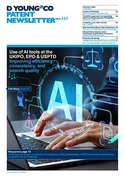Artificial intelligence originating inventions: can an AI system be designated as inventor?
Artificial Intelligence (AI) is a rapidly developing area of technology. AI systems are now capable of driving autonomous cars, performing translation of text, and assisting in healthcare and construction. AI systems are even capable of beating humans in games such as chess – an achievement which was originally considered out of reach for a computer. With the development of AI systems, the question arises: can an AI system be designated as an inventor under patent law?
The publication of the full decision for J 8/20 by the Board of Appeal answers a number of legal questions related to inventions which have been created by AI systems under European patent law.
Background
J 8/20 was an appeal against a decision to refuse the application EP 18 275 163, in which an AI system called DABUS was designated as inventor. The applicant was Dr Thaler (the inventor of DABUS).
At first instance, the application was refused on two grounds. In summary, these were:
- a designation indicating a machine as inventor did not meet the requirements of Article 81 and Rule 19(1) EPC, because an inventor within the meaning of the EPC had to be a natural person; and
- the statement indicating how the applicant acquired the right to the European patent did not meet the requirements of Articles 60(1) and 81 EPC, because a machine had no legal personality and could neither by an employee of the applicant nor transfer any right to the applicant.
The applicant then lodged an appeal against this decision.
With the appeal, the applicant (appellant) argued that the entity which comes up with the inventive concept was the deviser of the invention and should be recognised as such, since the public has a right to know how the invention was made. Moreover, the appellant argued that Dr Thaler acquired the right to the invention as the employer of DABUS or successor in title to the invention.
Reason for the decision
In J 8/20, the Board of Appeal agreed with the grounds of refusal of the first instance decision. In particular, the Board of Appeal noted that the designated inventor has to be a person with legal capacity.
According to the Board of Appeal, this is not merely an assumption on which the EPC was drafted. It is the ordinary meaning of the term inventor.
Indeed, the Board of Appeal confirmed that designating a machine without legal capacity does not serve the purpose of the legal provisions dealing with the inventor and its designation.
Nevertheless, the Board of Appeal accepted that it is arguable that AI-generated inventions are patentable under the EPC. In such a situation, where an AI-system has generated the invention, the user or owner of the device should designate themselves as the inventor under European patent law. Therefore, the Board of Appeal concluded that European patent law was able to accommodate AI originating inventions.
The Board of Appeal rejected the appellant’s argument that the public has a right to know who the inventor is and how the invention was made stating that there is no normative basis for this alleged right of the public. Moreover, the Board of Appeal rejected the appellant’s argument that Dr Thaler acquired the right to the invention as the employer of DABUS or successor in title to the invention. Indeed, the Board of Appeal stated that deriving the right to the European patent as owner and creator of the machine does not refer to a legal situation or transaction which would make Dr Thaler the successor in title of the invention.
Accordingly, the Board of Appeal dismissed the appeal.
Conclusion
The reasoning provided by the Board of Appeal in J 8/20 appears to provide a definitive answer regarding the designation of inventor for AI originating inventions. According to the Board of Appeal, an AI system cannot be designated as inventor. Instead, the user or owner of a device involved in an inventive activity should designate themselves as inventor under European patent law.
The Board of Appeal could envisage no subsequent practice or agreement which could be invoked to challenge this decision.
Nevertheless, these arguments rely on the principle that an AI system lacks legal personality – a machine cannot be a person and cannot own property. As AI systems become ever more advanced, one cannot help but feel that such a firm distinction between people and machines may become ever harder to maintain.


